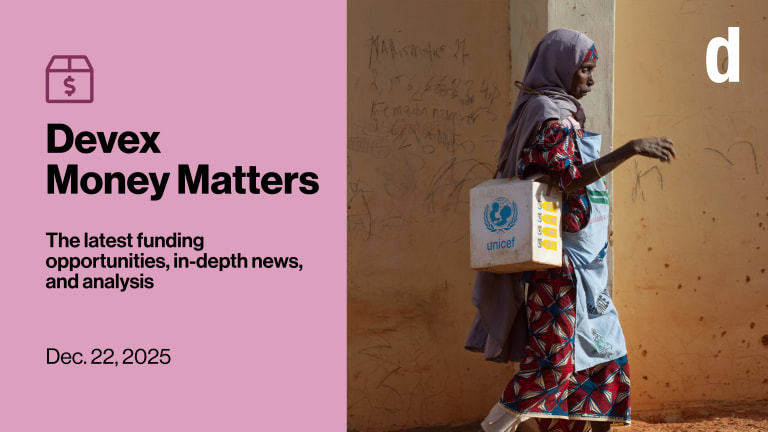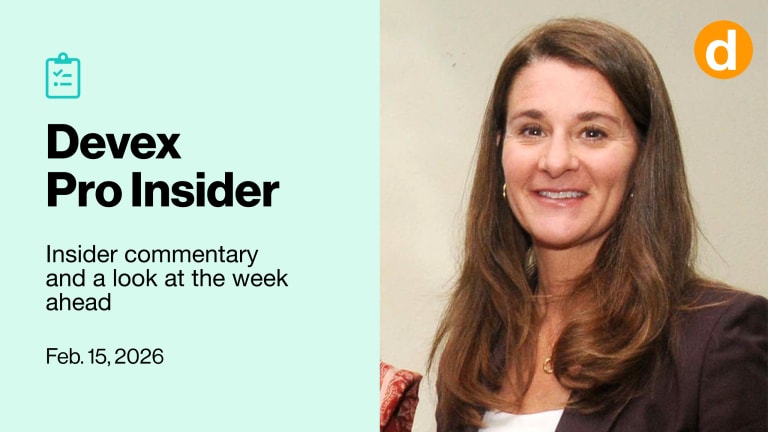
The European Commission’s budget battle heats up, the Asian Development Bank lays the groundwork for its future, and the Gates Foundation expands its efforts in the United States. This week in development:
The Asian Development Bank is holding its 51st annual meetings in Manila this week, with discussions geared toward informing the institution’s new long-term corporate strategy, which is still under review. The ADB’s annual operations reached a record $32.2 billion in 2017, with financing for climate mitigation and adaptation climbing to a new high of $4.5 billion. As it has grown, the bank has sought to adapt its financing and expertise to a region undergoing rapid and dramatic change. With Asia’s elderly population expected to approach 1 billion people by 2050, the ADB has wrestled with the social and economic implications of an aging population and positioned eldercare as a health sector priority, Jenny Ravelo reported for Devex from Manila. Through its Asia Regional Trade and Connectivity Fund, launched on Wednesday, the ADB has targeted regional integration as a key priority. The fund, a partnership with the United Kingdom’s Department for International Development, will provide “targeted financing for regional projects to increase poverty reduction and gender impacts in eight Central and South Asian countries,” Kelli Rogers reported for Devex from Manila.
The European Commission proposed a seven-year budget on Wednesday that raises international spending, but merges funding streams that some civil society organizations argue should be kept separate. The EC’s leaders proposed the creation of a “Neighbourhood, Development and International Cooperation Instrument (including external aspects of migration),” which they say would create more coherence. Critics worry the merger could deflect attention away from priorities such as the Sustainable Development Goals, in favor of European Union foreign policy issues such as preventing migration, Vince Chadwick reported for Devex. The budget proposes spending 123 billion euros on the European Union’s work outside its borders between 2021-2027, which would be a 26 percent increase from the period ending in 2020, but an insufficient increase to see EU countries reach the 0.7 percent of gross domestic product benchmark. EU development commissioner Neven Mimica told Devex the idea of a streamlined instrument “remains true to the very values and principles on which our development cooperation is built.”
The Bill & Melinda Gates Foundation announced Thursday that it will expand the scope of its U.S.-focused work beyond the education programs it currently supports. CEO Sue Desmond-Hellmann announced a commitment of $158 million over four years “to develop new strategies, improve coordination, and mobilize additional resources,” Catherine Cheney reported for Devex. The foundation currently spends about $500 million per year on U.S. education programs and roughly $4 billion per year internationally. The new strategy will focus on “mobility from poverty,” and it will seek to address the “barrier of persistent poverty” that has stymied the foundation’s education goals so far, Desmond-Hellmann told reporters ahead of the announcement.
Despite ambitious international targets to reduce “energy poverty,” 674 million people are expected to still be living without electricity by 2030, according to a new report. The Energy Progress Report, released at the Sustainable Energy for All conference in Lisbon, Portugal, on Wednesday, found that the international community is falling well short of the necessary progress to achieve SDG 7, which aims for universal energy access and a larger share of renewables by 2030. There are currently about 1 billion people living without access to electricity. The report found that access to clean cooking has made the least progress among the high-level goals it tracks, citing, “low consumer awareness, financing gaps, slow technological progress, and lack of infrastructure for fuel production and distribution,” Vince Chadwick reported for Devex from Lisbon.








